Health & Social Care: Principles of Care, Legislation & Safeguarding
VerifiedAdded on 2023/06/12
|12
|3830
|346
Essay
AI Summary
This essay provides a comprehensive analysis of the principles of care within health and social care settings. It delves into the core principles such as communication, respect, dignity, privacy, confidentiality, and autonomy, highlighting their importance in fostering trust and ethical conduct. The essay connects these principles to relevant theories like Maslow's Hierarchy of Needs and Roger's Humanistic Theory, illustrating their practical application in care practices. Furthermore, it examines the impact of key legislation, codes of conduct, and policies that underpin health and social care, emphasizing their role in raising awareness and ensuring systematic development of healthcare services. A critical evaluation of how the rights and autonomy of vulnerable individuals are protected and balanced to prevent abuse and harm is presented, alongside the significance of risk assessment in safeguarding vulnerable populations. The discussion extends to abuse, anti-discriminatory practices related to the Equality Act 2010, and other important considerations for maintaining equality and reducing discriminatory activities in the workplace. The essay concludes by reflecting on the principles of care and their influence on healthcare approaches, as well as personal experiences that shape individual development and insights in the field.
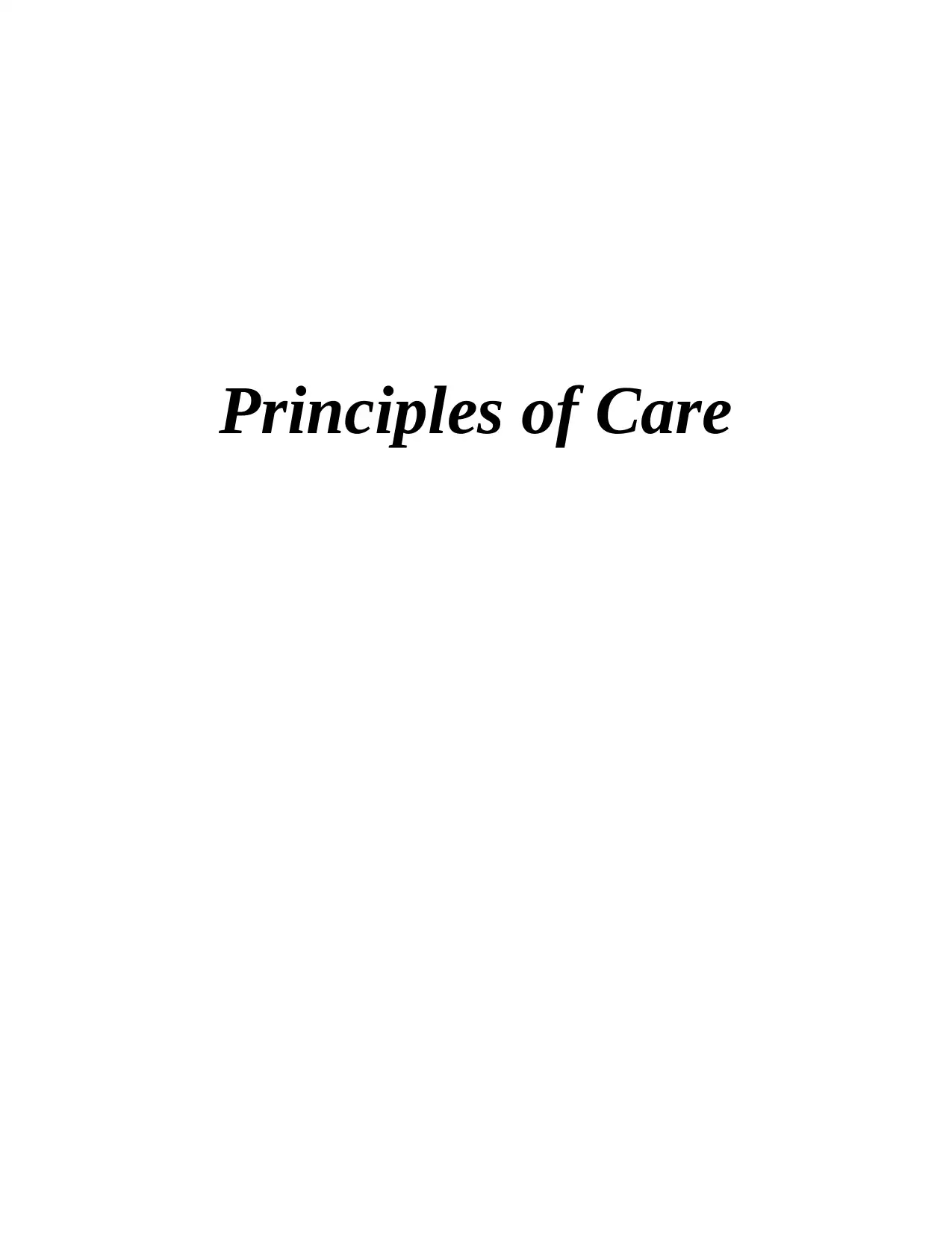
Principles of Care
Paraphrase This Document
Need a fresh take? Get an instant paraphrase of this document with our AI Paraphraser
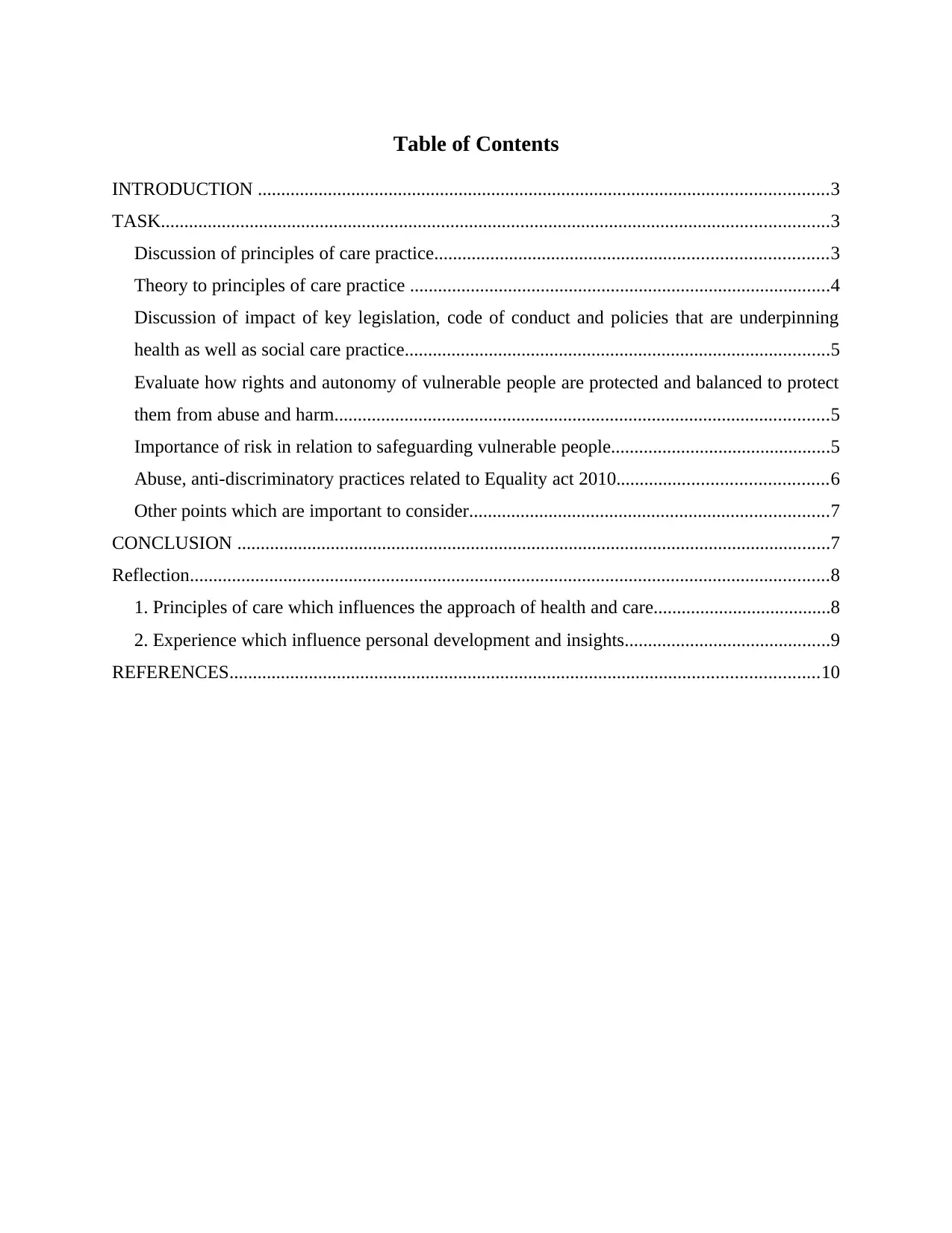
Table of Contents
INTRODUCTION ..........................................................................................................................3
TASK...............................................................................................................................................3
Discussion of principles of care practice....................................................................................3
Theory to principles of care practice ..........................................................................................4
Discussion of impact of key legislation, code of conduct and policies that are underpinning
health as well as social care practice...........................................................................................5
Evaluate how rights and autonomy of vulnerable people are protected and balanced to protect
them from abuse and harm..........................................................................................................5
Importance of risk in relation to safeguarding vulnerable people...............................................5
Abuse, anti-discriminatory practices related to Equality act 2010.............................................6
Other points which are important to consider.............................................................................7
CONCLUSION ...............................................................................................................................7
Reflection.........................................................................................................................................8
1. Principles of care which influences the approach of health and care......................................8
2. Experience which influence personal development and insights............................................9
REFERENCES..............................................................................................................................10
INTRODUCTION ..........................................................................................................................3
TASK...............................................................................................................................................3
Discussion of principles of care practice....................................................................................3
Theory to principles of care practice ..........................................................................................4
Discussion of impact of key legislation, code of conduct and policies that are underpinning
health as well as social care practice...........................................................................................5
Evaluate how rights and autonomy of vulnerable people are protected and balanced to protect
them from abuse and harm..........................................................................................................5
Importance of risk in relation to safeguarding vulnerable people...............................................5
Abuse, anti-discriminatory practices related to Equality act 2010.............................................6
Other points which are important to consider.............................................................................7
CONCLUSION ...............................................................................................................................7
Reflection.........................................................................................................................................8
1. Principles of care which influences the approach of health and care......................................8
2. Experience which influence personal development and insights............................................9
REFERENCES..............................................................................................................................10
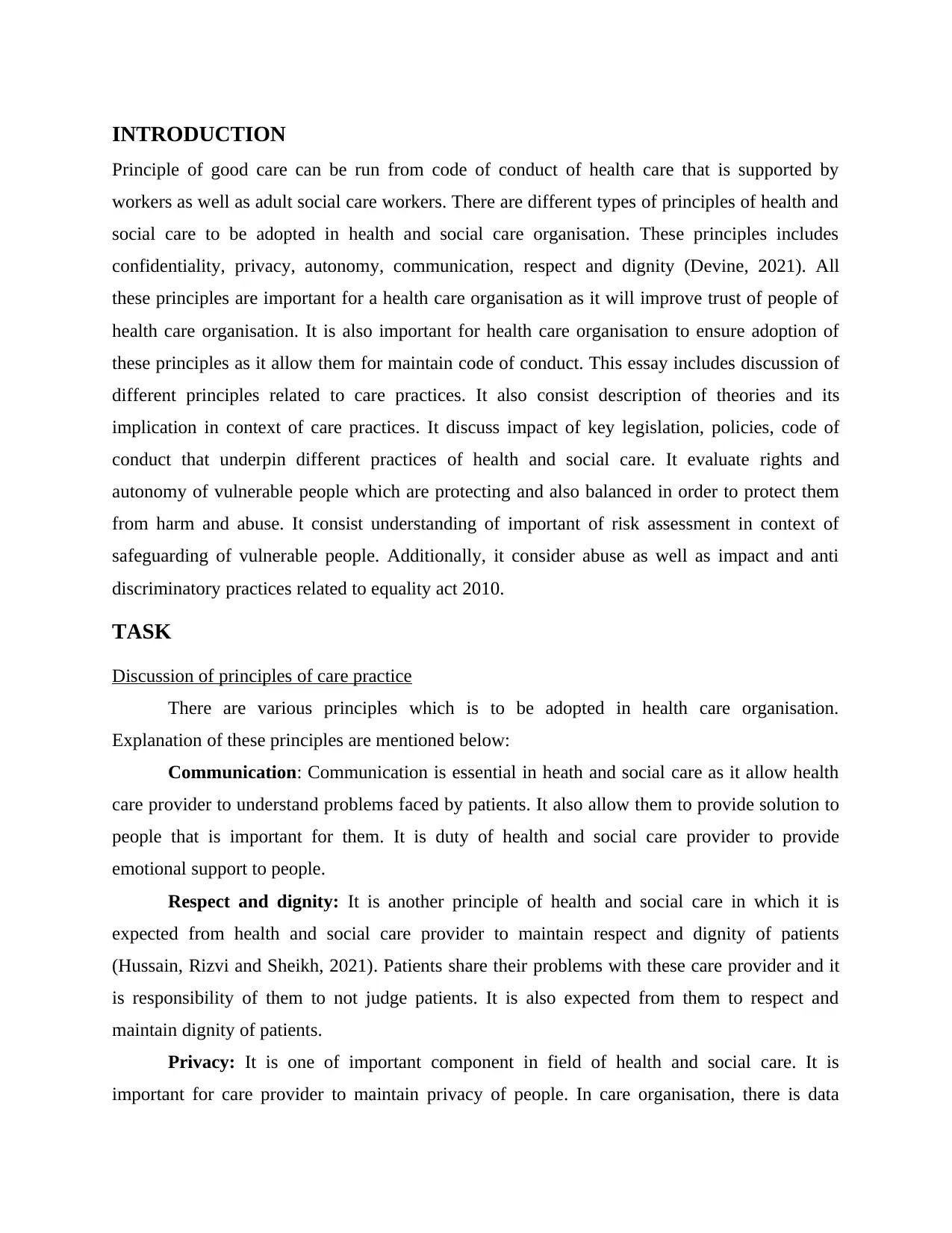
INTRODUCTION
Principle of good care can be run from code of conduct of health care that is supported by
workers as well as adult social care workers. There are different types of principles of health and
social care to be adopted in health and social care organisation. These principles includes
confidentiality, privacy, autonomy, communication, respect and dignity (Devine, 2021). All
these principles are important for a health care organisation as it will improve trust of people of
health care organisation. It is also important for health care organisation to ensure adoption of
these principles as it allow them for maintain code of conduct. This essay includes discussion of
different principles related to care practices. It also consist description of theories and its
implication in context of care practices. It discuss impact of key legislation, policies, code of
conduct that underpin different practices of health and social care. It evaluate rights and
autonomy of vulnerable people which are protecting and also balanced in order to protect them
from harm and abuse. It consist understanding of important of risk assessment in context of
safeguarding of vulnerable people. Additionally, it consider abuse as well as impact and anti
discriminatory practices related to equality act 2010.
TASK
Discussion of principles of care practice
There are various principles which is to be adopted in health care organisation.
Explanation of these principles are mentioned below:
Communication: Communication is essential in heath and social care as it allow health
care provider to understand problems faced by patients. It also allow them to provide solution to
people that is important for them. It is duty of health and social care provider to provide
emotional support to people.
Respect and dignity: It is another principle of health and social care in which it is
expected from health and social care provider to maintain respect and dignity of patients
(Hussain, Rizvi and Sheikh, 2021). Patients share their problems with these care provider and it
is responsibility of them to not judge patients. It is also expected from them to respect and
maintain dignity of patients.
Privacy: It is one of important component in field of health and social care. It is
important for care provider to maintain privacy of people. In care organisation, there is data
Principle of good care can be run from code of conduct of health care that is supported by
workers as well as adult social care workers. There are different types of principles of health and
social care to be adopted in health and social care organisation. These principles includes
confidentiality, privacy, autonomy, communication, respect and dignity (Devine, 2021). All
these principles are important for a health care organisation as it will improve trust of people of
health care organisation. It is also important for health care organisation to ensure adoption of
these principles as it allow them for maintain code of conduct. This essay includes discussion of
different principles related to care practices. It also consist description of theories and its
implication in context of care practices. It discuss impact of key legislation, policies, code of
conduct that underpin different practices of health and social care. It evaluate rights and
autonomy of vulnerable people which are protecting and also balanced in order to protect them
from harm and abuse. It consist understanding of important of risk assessment in context of
safeguarding of vulnerable people. Additionally, it consider abuse as well as impact and anti
discriminatory practices related to equality act 2010.
TASK
Discussion of principles of care practice
There are various principles which is to be adopted in health care organisation.
Explanation of these principles are mentioned below:
Communication: Communication is essential in heath and social care as it allow health
care provider to understand problems faced by patients. It also allow them to provide solution to
people that is important for them. It is duty of health and social care provider to provide
emotional support to people.
Respect and dignity: It is another principle of health and social care in which it is
expected from health and social care provider to maintain respect and dignity of patients
(Hussain, Rizvi and Sheikh, 2021). Patients share their problems with these care provider and it
is responsibility of them to not judge patients. It is also expected from them to respect and
maintain dignity of patients.
Privacy: It is one of important component in field of health and social care. It is
important for care provider to maintain privacy of people. In care organisation, there is data
⊘ This is a preview!⊘
Do you want full access?
Subscribe today to unlock all pages.

Trusted by 1+ million students worldwide
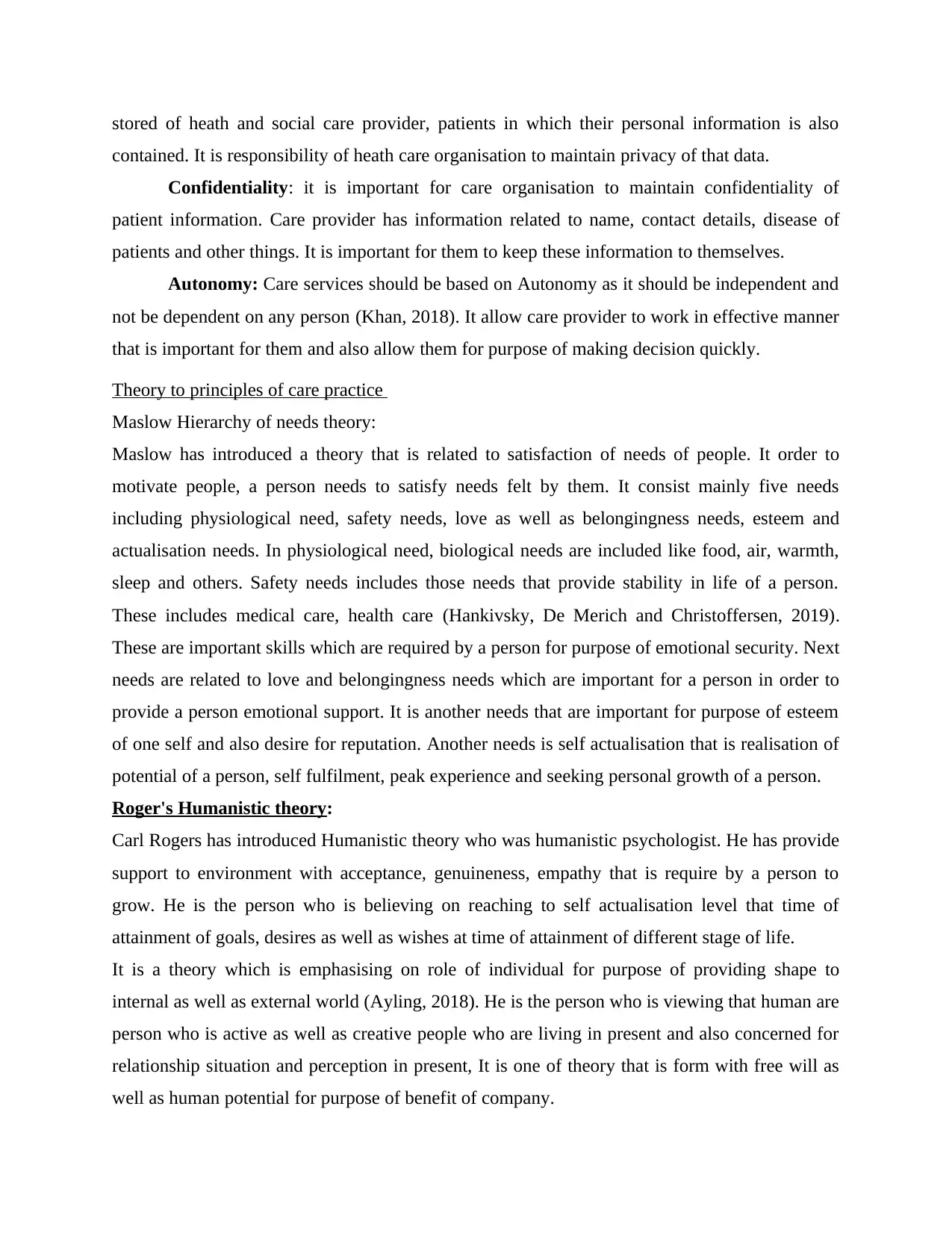
stored of heath and social care provider, patients in which their personal information is also
contained. It is responsibility of heath care organisation to maintain privacy of that data.
Confidentiality: it is important for care organisation to maintain confidentiality of
patient information. Care provider has information related to name, contact details, disease of
patients and other things. It is important for them to keep these information to themselves.
Autonomy: Care services should be based on Autonomy as it should be independent and
not be dependent on any person (Khan, 2018). It allow care provider to work in effective manner
that is important for them and also allow them for purpose of making decision quickly.
Theory to principles of care practice
Maslow Hierarchy of needs theory:
Maslow has introduced a theory that is related to satisfaction of needs of people. It order to
motivate people, a person needs to satisfy needs felt by them. It consist mainly five needs
including physiological need, safety needs, love as well as belongingness needs, esteem and
actualisation needs. In physiological need, biological needs are included like food, air, warmth,
sleep and others. Safety needs includes those needs that provide stability in life of a person.
These includes medical care, health care (Hankivsky, De Merich and Christoffersen, 2019).
These are important skills which are required by a person for purpose of emotional security. Next
needs are related to love and belongingness needs which are important for a person in order to
provide a person emotional support. It is another needs that are important for purpose of esteem
of one self and also desire for reputation. Another needs is self actualisation that is realisation of
potential of a person, self fulfilment, peak experience and seeking personal growth of a person.
Roger's Humanistic theory:
Carl Rogers has introduced Humanistic theory who was humanistic psychologist. He has provide
support to environment with acceptance, genuineness, empathy that is require by a person to
grow. He is the person who is believing on reaching to self actualisation level that time of
attainment of goals, desires as well as wishes at time of attainment of different stage of life.
It is a theory which is emphasising on role of individual for purpose of providing shape to
internal as well as external world (Ayling, 2018). He is the person who is viewing that human are
person who is active as well as creative people who are living in present and also concerned for
relationship situation and perception in present, It is one of theory that is form with free will as
well as human potential for purpose of benefit of company.
contained. It is responsibility of heath care organisation to maintain privacy of that data.
Confidentiality: it is important for care organisation to maintain confidentiality of
patient information. Care provider has information related to name, contact details, disease of
patients and other things. It is important for them to keep these information to themselves.
Autonomy: Care services should be based on Autonomy as it should be independent and
not be dependent on any person (Khan, 2018). It allow care provider to work in effective manner
that is important for them and also allow them for purpose of making decision quickly.
Theory to principles of care practice
Maslow Hierarchy of needs theory:
Maslow has introduced a theory that is related to satisfaction of needs of people. It order to
motivate people, a person needs to satisfy needs felt by them. It consist mainly five needs
including physiological need, safety needs, love as well as belongingness needs, esteem and
actualisation needs. In physiological need, biological needs are included like food, air, warmth,
sleep and others. Safety needs includes those needs that provide stability in life of a person.
These includes medical care, health care (Hankivsky, De Merich and Christoffersen, 2019).
These are important skills which are required by a person for purpose of emotional security. Next
needs are related to love and belongingness needs which are important for a person in order to
provide a person emotional support. It is another needs that are important for purpose of esteem
of one self and also desire for reputation. Another needs is self actualisation that is realisation of
potential of a person, self fulfilment, peak experience and seeking personal growth of a person.
Roger's Humanistic theory:
Carl Rogers has introduced Humanistic theory who was humanistic psychologist. He has provide
support to environment with acceptance, genuineness, empathy that is require by a person to
grow. He is the person who is believing on reaching to self actualisation level that time of
attainment of goals, desires as well as wishes at time of attainment of different stage of life.
It is a theory which is emphasising on role of individual for purpose of providing shape to
internal as well as external world (Ayling, 2018). He is the person who is viewing that human are
person who is active as well as creative people who are living in present and also concerned for
relationship situation and perception in present, It is one of theory that is form with free will as
well as human potential for purpose of benefit of company.
Paraphrase This Document
Need a fresh take? Get an instant paraphrase of this document with our AI Paraphraser
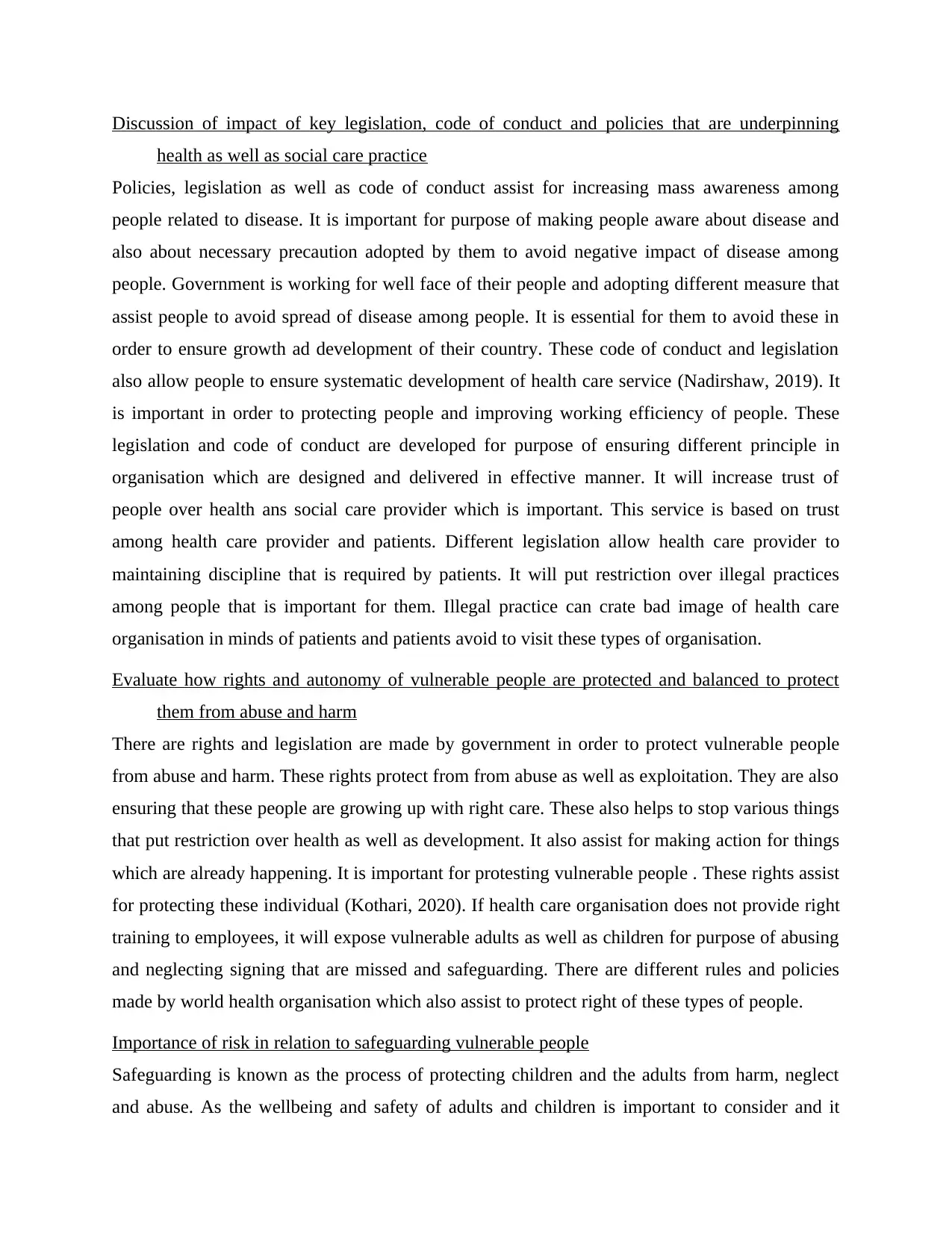
Discussion of impact of key legislation, code of conduct and policies that are underpinning
health as well as social care practice
Policies, legislation as well as code of conduct assist for increasing mass awareness among
people related to disease. It is important for purpose of making people aware about disease and
also about necessary precaution adopted by them to avoid negative impact of disease among
people. Government is working for well face of their people and adopting different measure that
assist people to avoid spread of disease among people. It is essential for them to avoid these in
order to ensure growth ad development of their country. These code of conduct and legislation
also allow people to ensure systematic development of health care service (Nadirshaw, 2019). It
is important in order to protecting people and improving working efficiency of people. These
legislation and code of conduct are developed for purpose of ensuring different principle in
organisation which are designed and delivered in effective manner. It will increase trust of
people over health ans social care provider which is important. This service is based on trust
among health care provider and patients. Different legislation allow health care provider to
maintaining discipline that is required by patients. It will put restriction over illegal practices
among people that is important for them. Illegal practice can crate bad image of health care
organisation in minds of patients and patients avoid to visit these types of organisation.
Evaluate how rights and autonomy of vulnerable people are protected and balanced to protect
them from abuse and harm
There are rights and legislation are made by government in order to protect vulnerable people
from abuse and harm. These rights protect from from abuse as well as exploitation. They are also
ensuring that these people are growing up with right care. These also helps to stop various things
that put restriction over health as well as development. It also assist for making action for things
which are already happening. It is important for protesting vulnerable people . These rights assist
for protecting these individual (Kothari, 2020). If health care organisation does not provide right
training to employees, it will expose vulnerable adults as well as children for purpose of abusing
and neglecting signing that are missed and safeguarding. There are different rules and policies
made by world health organisation which also assist to protect right of these types of people.
Importance of risk in relation to safeguarding vulnerable people
Safeguarding is known as the process of protecting children and the adults from harm, neglect
and abuse. As the wellbeing and safety of adults and children is important to consider and it
health as well as social care practice
Policies, legislation as well as code of conduct assist for increasing mass awareness among
people related to disease. It is important for purpose of making people aware about disease and
also about necessary precaution adopted by them to avoid negative impact of disease among
people. Government is working for well face of their people and adopting different measure that
assist people to avoid spread of disease among people. It is essential for them to avoid these in
order to ensure growth ad development of their country. These code of conduct and legislation
also allow people to ensure systematic development of health care service (Nadirshaw, 2019). It
is important in order to protecting people and improving working efficiency of people. These
legislation and code of conduct are developed for purpose of ensuring different principle in
organisation which are designed and delivered in effective manner. It will increase trust of
people over health ans social care provider which is important. This service is based on trust
among health care provider and patients. Different legislation allow health care provider to
maintaining discipline that is required by patients. It will put restriction over illegal practices
among people that is important for them. Illegal practice can crate bad image of health care
organisation in minds of patients and patients avoid to visit these types of organisation.
Evaluate how rights and autonomy of vulnerable people are protected and balanced to protect
them from abuse and harm
There are rights and legislation are made by government in order to protect vulnerable people
from abuse and harm. These rights protect from from abuse as well as exploitation. They are also
ensuring that these people are growing up with right care. These also helps to stop various things
that put restriction over health as well as development. It also assist for making action for things
which are already happening. It is important for protesting vulnerable people . These rights assist
for protecting these individual (Kothari, 2020). If health care organisation does not provide right
training to employees, it will expose vulnerable adults as well as children for purpose of abusing
and neglecting signing that are missed and safeguarding. There are different rules and policies
made by world health organisation which also assist to protect right of these types of people.
Importance of risk in relation to safeguarding vulnerable people
Safeguarding is known as the process of protecting children and the adults from harm, neglect
and abuse. As the wellbeing and safety of adults and children is important to consider and it
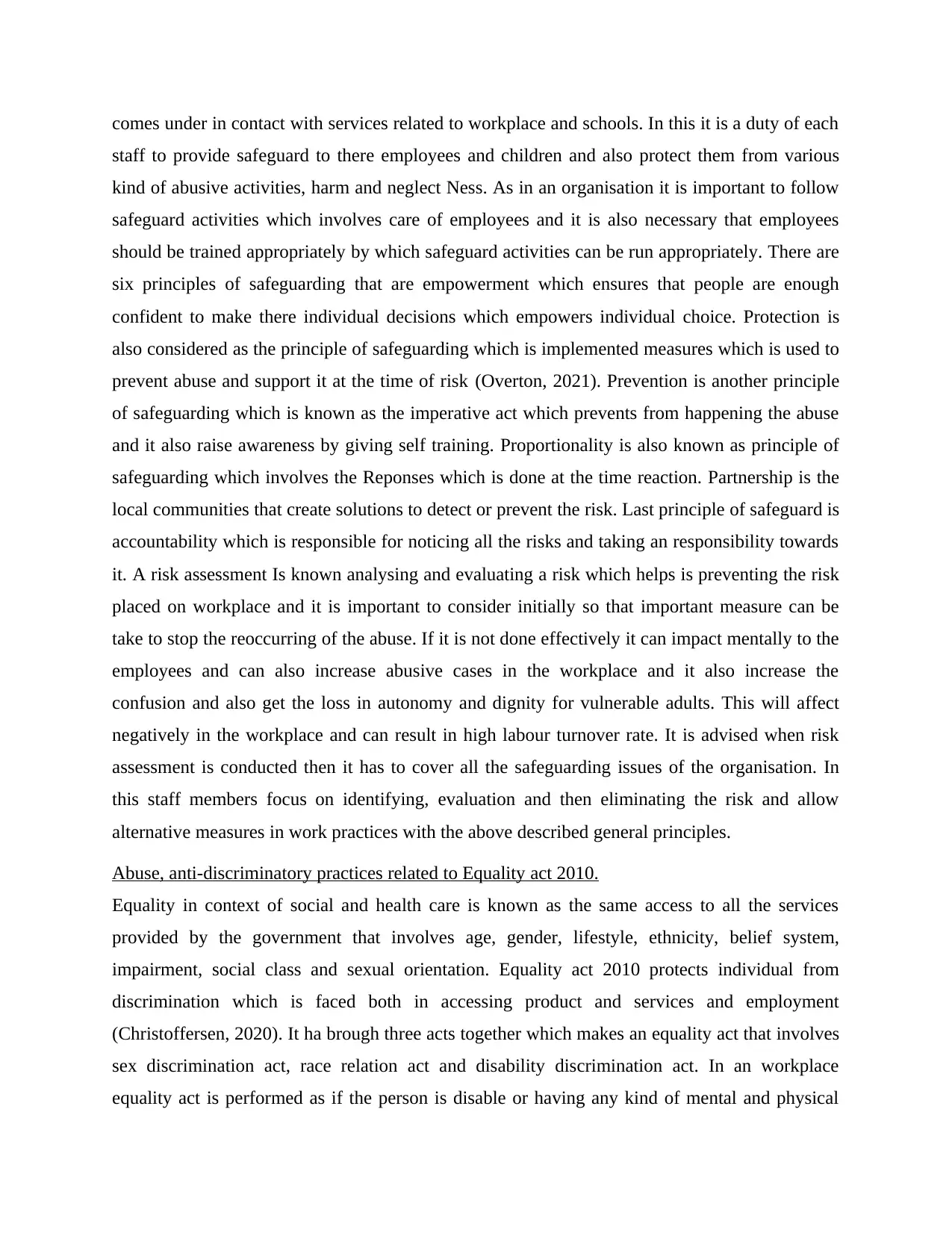
comes under in contact with services related to workplace and schools. In this it is a duty of each
staff to provide safeguard to there employees and children and also protect them from various
kind of abusive activities, harm and neglect Ness. As in an organisation it is important to follow
safeguard activities which involves care of employees and it is also necessary that employees
should be trained appropriately by which safeguard activities can be run appropriately. There are
six principles of safeguarding that are empowerment which ensures that people are enough
confident to make there individual decisions which empowers individual choice. Protection is
also considered as the principle of safeguarding which is implemented measures which is used to
prevent abuse and support it at the time of risk (Overton, 2021). Prevention is another principle
of safeguarding which is known as the imperative act which prevents from happening the abuse
and it also raise awareness by giving self training. Proportionality is also known as principle of
safeguarding which involves the Reponses which is done at the time reaction. Partnership is the
local communities that create solutions to detect or prevent the risk. Last principle of safeguard is
accountability which is responsible for noticing all the risks and taking an responsibility towards
it. A risk assessment Is known analysing and evaluating a risk which helps is preventing the risk
placed on workplace and it is important to consider initially so that important measure can be
take to stop the reoccurring of the abuse. If it is not done effectively it can impact mentally to the
employees and can also increase abusive cases in the workplace and it also increase the
confusion and also get the loss in autonomy and dignity for vulnerable adults. This will affect
negatively in the workplace and can result in high labour turnover rate. It is advised when risk
assessment is conducted then it has to cover all the safeguarding issues of the organisation. In
this staff members focus on identifying, evaluation and then eliminating the risk and allow
alternative measures in work practices with the above described general principles.
Abuse, anti-discriminatory practices related to Equality act 2010.
Equality in context of social and health care is known as the same access to all the services
provided by the government that involves age, gender, lifestyle, ethnicity, belief system,
impairment, social class and sexual orientation. Equality act 2010 protects individual from
discrimination which is faced both in accessing product and services and employment
(Christoffersen, 2020). It ha brough three acts together which makes an equality act that involves
sex discrimination act, race relation act and disability discrimination act. In an workplace
equality act is performed as if the person is disable or having any kind of mental and physical
staff to provide safeguard to there employees and children and also protect them from various
kind of abusive activities, harm and neglect Ness. As in an organisation it is important to follow
safeguard activities which involves care of employees and it is also necessary that employees
should be trained appropriately by which safeguard activities can be run appropriately. There are
six principles of safeguarding that are empowerment which ensures that people are enough
confident to make there individual decisions which empowers individual choice. Protection is
also considered as the principle of safeguarding which is implemented measures which is used to
prevent abuse and support it at the time of risk (Overton, 2021). Prevention is another principle
of safeguarding which is known as the imperative act which prevents from happening the abuse
and it also raise awareness by giving self training. Proportionality is also known as principle of
safeguarding which involves the Reponses which is done at the time reaction. Partnership is the
local communities that create solutions to detect or prevent the risk. Last principle of safeguard is
accountability which is responsible for noticing all the risks and taking an responsibility towards
it. A risk assessment Is known analysing and evaluating a risk which helps is preventing the risk
placed on workplace and it is important to consider initially so that important measure can be
take to stop the reoccurring of the abuse. If it is not done effectively it can impact mentally to the
employees and can also increase abusive cases in the workplace and it also increase the
confusion and also get the loss in autonomy and dignity for vulnerable adults. This will affect
negatively in the workplace and can result in high labour turnover rate. It is advised when risk
assessment is conducted then it has to cover all the safeguarding issues of the organisation. In
this staff members focus on identifying, evaluation and then eliminating the risk and allow
alternative measures in work practices with the above described general principles.
Abuse, anti-discriminatory practices related to Equality act 2010.
Equality in context of social and health care is known as the same access to all the services
provided by the government that involves age, gender, lifestyle, ethnicity, belief system,
impairment, social class and sexual orientation. Equality act 2010 protects individual from
discrimination which is faced both in accessing product and services and employment
(Christoffersen, 2020). It ha brough three acts together which makes an equality act that involves
sex discrimination act, race relation act and disability discrimination act. In an workplace
equality act is performed as if the person is disable or having any kind of mental and physical
⊘ This is a preview!⊘
Do you want full access?
Subscribe today to unlock all pages.

Trusted by 1+ million students worldwide
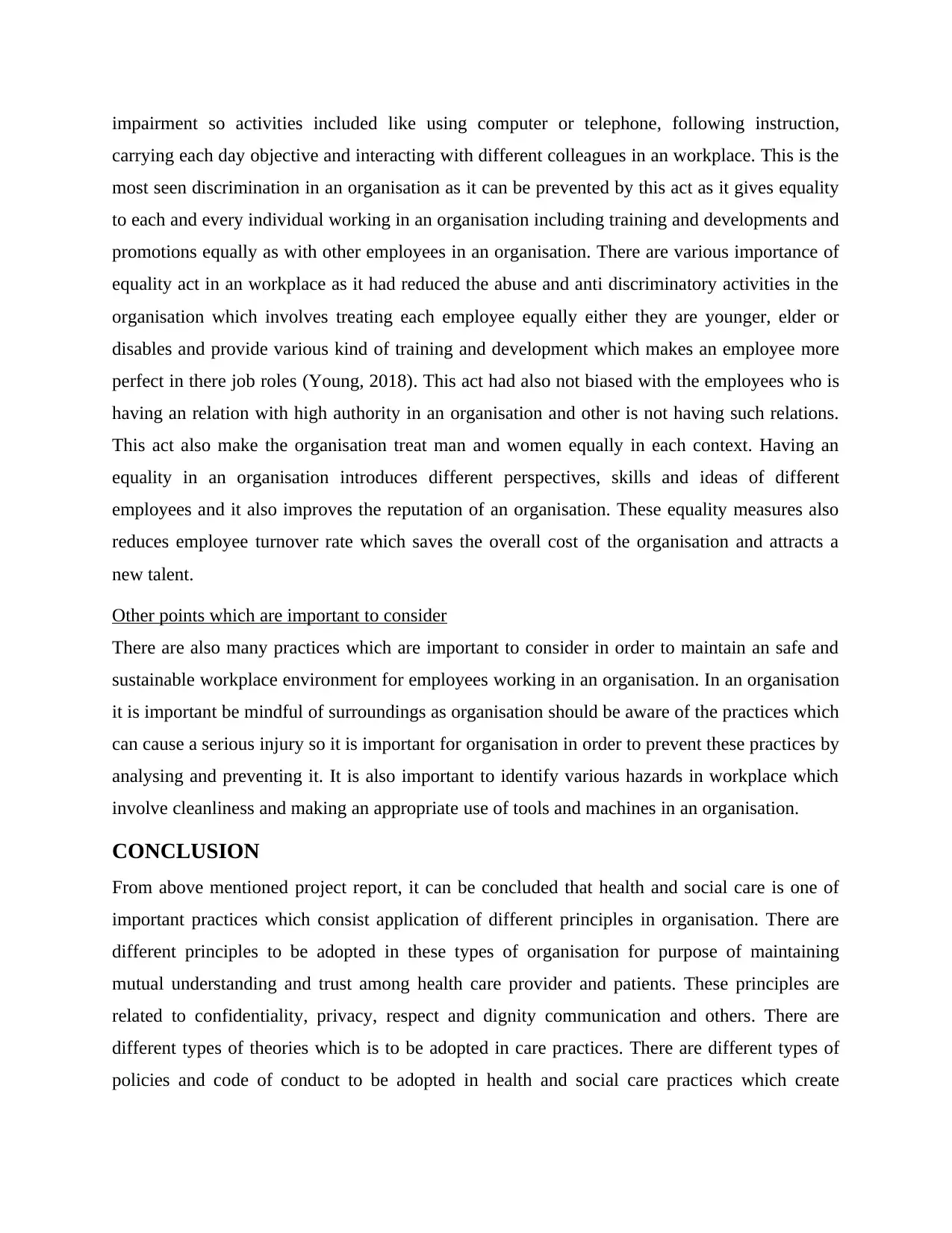
impairment so activities included like using computer or telephone, following instruction,
carrying each day objective and interacting with different colleagues in an workplace. This is the
most seen discrimination in an organisation as it can be prevented by this act as it gives equality
to each and every individual working in an organisation including training and developments and
promotions equally as with other employees in an organisation. There are various importance of
equality act in an workplace as it had reduced the abuse and anti discriminatory activities in the
organisation which involves treating each employee equally either they are younger, elder or
disables and provide various kind of training and development which makes an employee more
perfect in there job roles (Young, 2018). This act had also not biased with the employees who is
having an relation with high authority in an organisation and other is not having such relations.
This act also make the organisation treat man and women equally in each context. Having an
equality in an organisation introduces different perspectives, skills and ideas of different
employees and it also improves the reputation of an organisation. These equality measures also
reduces employee turnover rate which saves the overall cost of the organisation and attracts a
new talent.
Other points which are important to consider
There are also many practices which are important to consider in order to maintain an safe and
sustainable workplace environment for employees working in an organisation. In an organisation
it is important be mindful of surroundings as organisation should be aware of the practices which
can cause a serious injury so it is important for organisation in order to prevent these practices by
analysing and preventing it. It is also important to identify various hazards in workplace which
involve cleanliness and making an appropriate use of tools and machines in an organisation.
CONCLUSION
From above mentioned project report, it can be concluded that health and social care is one of
important practices which consist application of different principles in organisation. There are
different principles to be adopted in these types of organisation for purpose of maintaining
mutual understanding and trust among health care provider and patients. These principles are
related to confidentiality, privacy, respect and dignity communication and others. There are
different types of theories which is to be adopted in care practices. There are different types of
policies and code of conduct to be adopted in health and social care practices which create
carrying each day objective and interacting with different colleagues in an workplace. This is the
most seen discrimination in an organisation as it can be prevented by this act as it gives equality
to each and every individual working in an organisation including training and developments and
promotions equally as with other employees in an organisation. There are various importance of
equality act in an workplace as it had reduced the abuse and anti discriminatory activities in the
organisation which involves treating each employee equally either they are younger, elder or
disables and provide various kind of training and development which makes an employee more
perfect in there job roles (Young, 2018). This act had also not biased with the employees who is
having an relation with high authority in an organisation and other is not having such relations.
This act also make the organisation treat man and women equally in each context. Having an
equality in an organisation introduces different perspectives, skills and ideas of different
employees and it also improves the reputation of an organisation. These equality measures also
reduces employee turnover rate which saves the overall cost of the organisation and attracts a
new talent.
Other points which are important to consider
There are also many practices which are important to consider in order to maintain an safe and
sustainable workplace environment for employees working in an organisation. In an organisation
it is important be mindful of surroundings as organisation should be aware of the practices which
can cause a serious injury so it is important for organisation in order to prevent these practices by
analysing and preventing it. It is also important to identify various hazards in workplace which
involve cleanliness and making an appropriate use of tools and machines in an organisation.
CONCLUSION
From above mentioned project report, it can be concluded that health and social care is one of
important practices which consist application of different principles in organisation. There are
different principles to be adopted in these types of organisation for purpose of maintaining
mutual understanding and trust among health care provider and patients. These principles are
related to confidentiality, privacy, respect and dignity communication and others. There are
different types of theories which is to be adopted in care practices. There are different types of
policies and code of conduct to be adopted in health and social care practices which create
Paraphrase This Document
Need a fresh take? Get an instant paraphrase of this document with our AI Paraphraser
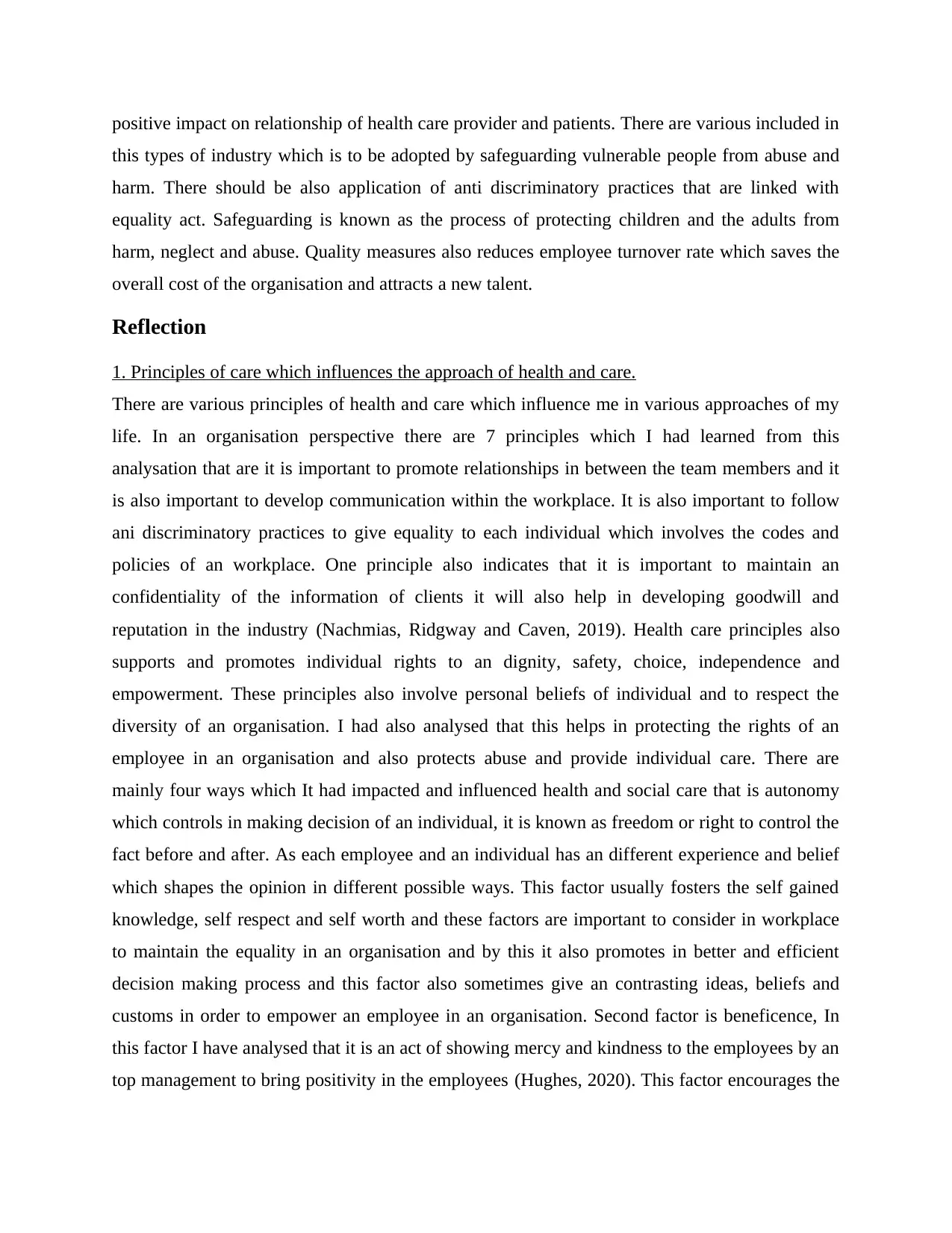
positive impact on relationship of health care provider and patients. There are various included in
this types of industry which is to be adopted by safeguarding vulnerable people from abuse and
harm. There should be also application of anti discriminatory practices that are linked with
equality act. Safeguarding is known as the process of protecting children and the adults from
harm, neglect and abuse. Quality measures also reduces employee turnover rate which saves the
overall cost of the organisation and attracts a new talent.
Reflection
1. Principles of care which influences the approach of health and care.
There are various principles of health and care which influence me in various approaches of my
life. In an organisation perspective there are 7 principles which I had learned from this
analysation that are it is important to promote relationships in between the team members and it
is also important to develop communication within the workplace. It is also important to follow
ani discriminatory practices to give equality to each individual which involves the codes and
policies of an workplace. One principle also indicates that it is important to maintain an
confidentiality of the information of clients it will also help in developing goodwill and
reputation in the industry (Nachmias, Ridgway and Caven, 2019). Health care principles also
supports and promotes individual rights to an dignity, safety, choice, independence and
empowerment. These principles also involve personal beliefs of individual and to respect the
diversity of an organisation. I had also analysed that this helps in protecting the rights of an
employee in an organisation and also protects abuse and provide individual care. There are
mainly four ways which It had impacted and influenced health and social care that is autonomy
which controls in making decision of an individual, it is known as freedom or right to control the
fact before and after. As each employee and an individual has an different experience and belief
which shapes the opinion in different possible ways. This factor usually fosters the self gained
knowledge, self respect and self worth and these factors are important to consider in workplace
to maintain the equality in an organisation and by this it also promotes in better and efficient
decision making process and this factor also sometimes give an contrasting ideas, beliefs and
customs in order to empower an employee in an organisation. Second factor is beneficence, In
this factor I have analysed that it is an act of showing mercy and kindness to the employees by an
top management to bring positivity in the employees (Hughes, 2020). This factor encourages the
this types of industry which is to be adopted by safeguarding vulnerable people from abuse and
harm. There should be also application of anti discriminatory practices that are linked with
equality act. Safeguarding is known as the process of protecting children and the adults from
harm, neglect and abuse. Quality measures also reduces employee turnover rate which saves the
overall cost of the organisation and attracts a new talent.
Reflection
1. Principles of care which influences the approach of health and care.
There are various principles of health and care which influence me in various approaches of my
life. In an organisation perspective there are 7 principles which I had learned from this
analysation that are it is important to promote relationships in between the team members and it
is also important to develop communication within the workplace. It is also important to follow
ani discriminatory practices to give equality to each individual which involves the codes and
policies of an workplace. One principle also indicates that it is important to maintain an
confidentiality of the information of clients it will also help in developing goodwill and
reputation in the industry (Nachmias, Ridgway and Caven, 2019). Health care principles also
supports and promotes individual rights to an dignity, safety, choice, independence and
empowerment. These principles also involve personal beliefs of individual and to respect the
diversity of an organisation. I had also analysed that this helps in protecting the rights of an
employee in an organisation and also protects abuse and provide individual care. There are
mainly four ways which It had impacted and influenced health and social care that is autonomy
which controls in making decision of an individual, it is known as freedom or right to control the
fact before and after. As each employee and an individual has an different experience and belief
which shapes the opinion in different possible ways. This factor usually fosters the self gained
knowledge, self respect and self worth and these factors are important to consider in workplace
to maintain the equality in an organisation and by this it also promotes in better and efficient
decision making process and this factor also sometimes give an contrasting ideas, beliefs and
customs in order to empower an employee in an organisation. Second factor is beneficence, In
this factor I have analysed that it is an act of showing mercy and kindness to the employees by an
top management to bring positivity in the employees (Hughes, 2020). This factor encourages the
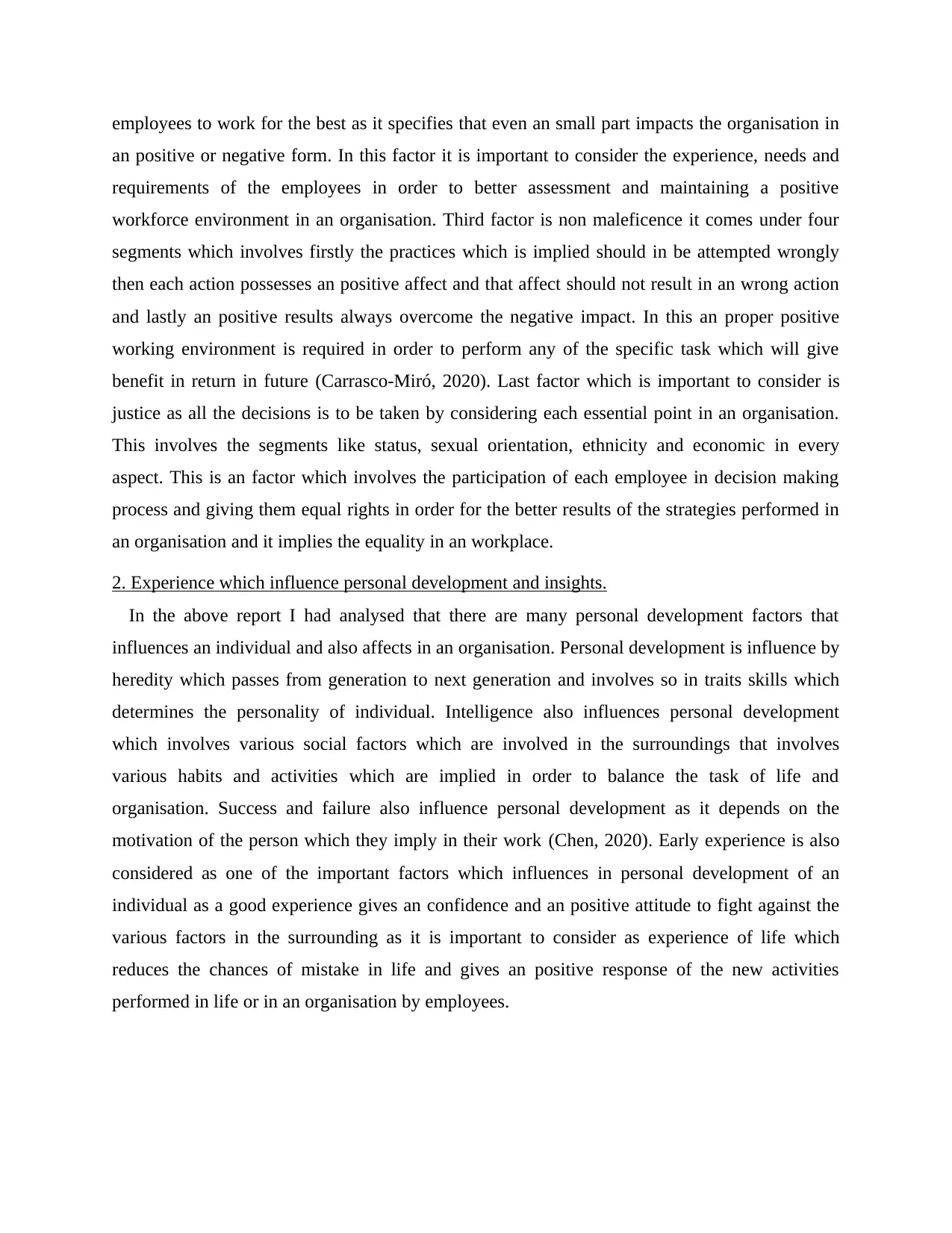
employees to work for the best as it specifies that even an small part impacts the organisation in
an positive or negative form. In this factor it is important to consider the experience, needs and
requirements of the employees in order to better assessment and maintaining a positive
workforce environment in an organisation. Third factor is non maleficence it comes under four
segments which involves firstly the practices which is implied should in be attempted wrongly
then each action possesses an positive affect and that affect should not result in an wrong action
and lastly an positive results always overcome the negative impact. In this an proper positive
working environment is required in order to perform any of the specific task which will give
benefit in return in future (Carrasco-Miró, 2020). Last factor which is important to consider is
justice as all the decisions is to be taken by considering each essential point in an organisation.
This involves the segments like status, sexual orientation, ethnicity and economic in every
aspect. This is an factor which involves the participation of each employee in decision making
process and giving them equal rights in order for the better results of the strategies performed in
an organisation and it implies the equality in an workplace.
2. Experience which influence personal development and insights.
In the above report I had analysed that there are many personal development factors that
influences an individual and also affects in an organisation. Personal development is influence by
heredity which passes from generation to next generation and involves so in traits skills which
determines the personality of individual. Intelligence also influences personal development
which involves various social factors which are involved in the surroundings that involves
various habits and activities which are implied in order to balance the task of life and
organisation. Success and failure also influence personal development as it depends on the
motivation of the person which they imply in their work (Chen, 2020). Early experience is also
considered as one of the important factors which influences in personal development of an
individual as a good experience gives an confidence and an positive attitude to fight against the
various factors in the surrounding as it is important to consider as experience of life which
reduces the chances of mistake in life and gives an positive response of the new activities
performed in life or in an organisation by employees.
an positive or negative form. In this factor it is important to consider the experience, needs and
requirements of the employees in order to better assessment and maintaining a positive
workforce environment in an organisation. Third factor is non maleficence it comes under four
segments which involves firstly the practices which is implied should in be attempted wrongly
then each action possesses an positive affect and that affect should not result in an wrong action
and lastly an positive results always overcome the negative impact. In this an proper positive
working environment is required in order to perform any of the specific task which will give
benefit in return in future (Carrasco-Miró, 2020). Last factor which is important to consider is
justice as all the decisions is to be taken by considering each essential point in an organisation.
This involves the segments like status, sexual orientation, ethnicity and economic in every
aspect. This is an factor which involves the participation of each employee in decision making
process and giving them equal rights in order for the better results of the strategies performed in
an organisation and it implies the equality in an workplace.
2. Experience which influence personal development and insights.
In the above report I had analysed that there are many personal development factors that
influences an individual and also affects in an organisation. Personal development is influence by
heredity which passes from generation to next generation and involves so in traits skills which
determines the personality of individual. Intelligence also influences personal development
which involves various social factors which are involved in the surroundings that involves
various habits and activities which are implied in order to balance the task of life and
organisation. Success and failure also influence personal development as it depends on the
motivation of the person which they imply in their work (Chen, 2020). Early experience is also
considered as one of the important factors which influences in personal development of an
individual as a good experience gives an confidence and an positive attitude to fight against the
various factors in the surrounding as it is important to consider as experience of life which
reduces the chances of mistake in life and gives an positive response of the new activities
performed in life or in an organisation by employees.
⊘ This is a preview!⊘
Do you want full access?
Subscribe today to unlock all pages.

Trusted by 1+ million students worldwide
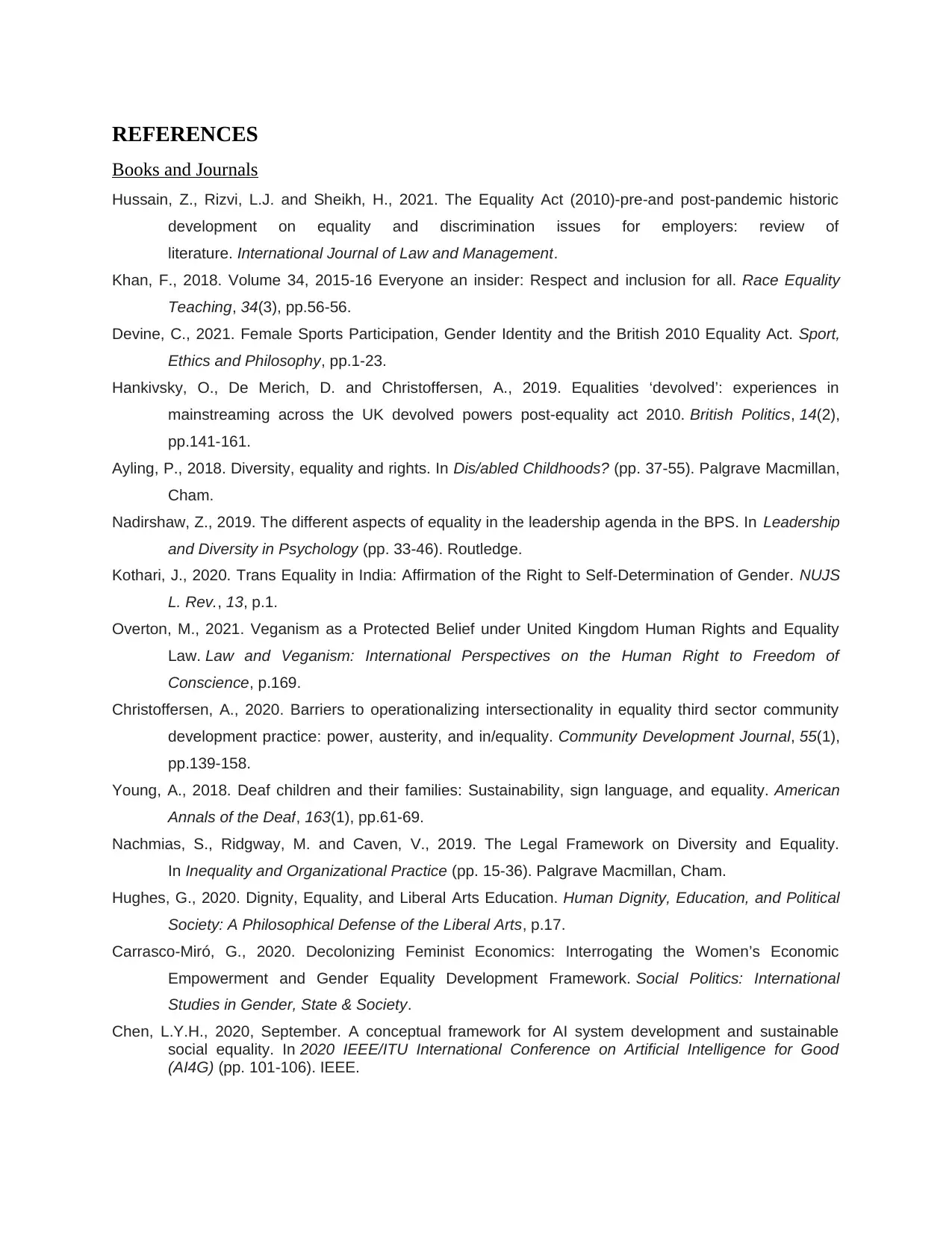
REFERENCES
Books and Journals
Hussain, Z., Rizvi, L.J. and Sheikh, H., 2021. The Equality Act (2010)-pre-and post-pandemic historic
development on equality and discrimination issues for employers: review of
literature. International Journal of Law and Management.
Khan, F., 2018. Volume 34, 2015-16 Everyone an insider: Respect and inclusion for all. Race Equality
Teaching, 34(3), pp.56-56.
Devine, C., 2021. Female Sports Participation, Gender Identity and the British 2010 Equality Act. Sport,
Ethics and Philosophy, pp.1-23.
Hankivsky, O., De Merich, D. and Christoffersen, A., 2019. Equalities ‘devolved’: experiences in
mainstreaming across the UK devolved powers post-equality act 2010. British Politics, 14(2),
pp.141-161.
Ayling, P., 2018. Diversity, equality and rights. In Dis/abled Childhoods? (pp. 37-55). Palgrave Macmillan,
Cham.
Nadirshaw, Z., 2019. The different aspects of equality in the leadership agenda in the BPS. In Leadership
and Diversity in Psychology (pp. 33-46). Routledge.
Kothari, J., 2020. Trans Equality in India: Affirmation of the Right to Self-Determination of Gender. NUJS
L. Rev., 13, p.1.
Overton, M., 2021. Veganism as a Protected Belief under United Kingdom Human Rights and Equality
Law. Law and Veganism: International Perspectives on the Human Right to Freedom of
Conscience, p.169.
Christoffersen, A., 2020. Barriers to operationalizing intersectionality in equality third sector community
development practice: power, austerity, and in/equality. Community Development Journal, 55(1),
pp.139-158.
Young, A., 2018. Deaf children and their families: Sustainability, sign language, and equality. American
Annals of the Deaf, 163(1), pp.61-69.
Nachmias, S., Ridgway, M. and Caven, V., 2019. The Legal Framework on Diversity and Equality.
In Inequality and Organizational Practice (pp. 15-36). Palgrave Macmillan, Cham.
Hughes, G., 2020. Dignity, Equality, and Liberal Arts Education. Human Dignity, Education, and Political
Society: A Philosophical Defense of the Liberal Arts, p.17.
Carrasco-Miró, G., 2020. Decolonizing Feminist Economics: Interrogating the Women’s Economic
Empowerment and Gender Equality Development Framework. Social Politics: International
Studies in Gender, State & Society.
Chen, L.Y.H., 2020, September. A conceptual framework for AI system development and sustainable
social equality. In 2020 IEEE/ITU International Conference on Artificial Intelligence for Good
(AI4G) (pp. 101-106). IEEE.
Books and Journals
Hussain, Z., Rizvi, L.J. and Sheikh, H., 2021. The Equality Act (2010)-pre-and post-pandemic historic
development on equality and discrimination issues for employers: review of
literature. International Journal of Law and Management.
Khan, F., 2018. Volume 34, 2015-16 Everyone an insider: Respect and inclusion for all. Race Equality
Teaching, 34(3), pp.56-56.
Devine, C., 2021. Female Sports Participation, Gender Identity and the British 2010 Equality Act. Sport,
Ethics and Philosophy, pp.1-23.
Hankivsky, O., De Merich, D. and Christoffersen, A., 2019. Equalities ‘devolved’: experiences in
mainstreaming across the UK devolved powers post-equality act 2010. British Politics, 14(2),
pp.141-161.
Ayling, P., 2018. Diversity, equality and rights. In Dis/abled Childhoods? (pp. 37-55). Palgrave Macmillan,
Cham.
Nadirshaw, Z., 2019. The different aspects of equality in the leadership agenda in the BPS. In Leadership
and Diversity in Psychology (pp. 33-46). Routledge.
Kothari, J., 2020. Trans Equality in India: Affirmation of the Right to Self-Determination of Gender. NUJS
L. Rev., 13, p.1.
Overton, M., 2021. Veganism as a Protected Belief under United Kingdom Human Rights and Equality
Law. Law and Veganism: International Perspectives on the Human Right to Freedom of
Conscience, p.169.
Christoffersen, A., 2020. Barriers to operationalizing intersectionality in equality third sector community
development practice: power, austerity, and in/equality. Community Development Journal, 55(1),
pp.139-158.
Young, A., 2018. Deaf children and their families: Sustainability, sign language, and equality. American
Annals of the Deaf, 163(1), pp.61-69.
Nachmias, S., Ridgway, M. and Caven, V., 2019. The Legal Framework on Diversity and Equality.
In Inequality and Organizational Practice (pp. 15-36). Palgrave Macmillan, Cham.
Hughes, G., 2020. Dignity, Equality, and Liberal Arts Education. Human Dignity, Education, and Political
Society: A Philosophical Defense of the Liberal Arts, p.17.
Carrasco-Miró, G., 2020. Decolonizing Feminist Economics: Interrogating the Women’s Economic
Empowerment and Gender Equality Development Framework. Social Politics: International
Studies in Gender, State & Society.
Chen, L.Y.H., 2020, September. A conceptual framework for AI system development and sustainable
social equality. In 2020 IEEE/ITU International Conference on Artificial Intelligence for Good
(AI4G) (pp. 101-106). IEEE.
Paraphrase This Document
Need a fresh take? Get an instant paraphrase of this document with our AI Paraphraser


⊘ This is a preview!⊘
Do you want full access?
Subscribe today to unlock all pages.

Trusted by 1+ million students worldwide
1 out of 12
Related Documents
Your All-in-One AI-Powered Toolkit for Academic Success.
+13062052269
info@desklib.com
Available 24*7 on WhatsApp / Email
![[object Object]](/_next/static/media/star-bottom.7253800d.svg)
Unlock your academic potential
© 2024 | Zucol Services PVT LTD | All rights reserved.



